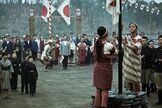The bloody nature of the Seediq also touched me before the massacre. The sun flag was waved, and tears in my eyes were also moved when the Sediq set off with determination to die.
Resistance is definite and absolutely understandable. Rather than being annihilated because of beating a vicious Japanese, it is better to fight to death and make you pay the price, rediscover my pride in my bones, and straighten up my bent waist.
However, the scene of the last massacre made my scalp numb and reminded me of 75 and 314.
Bloodliness is a proud rebellion, but if this rebellion is a massacre of all men, women, and children, indiscriminate massacres of the unarmed and innocent, I really find it difficult to accept. Even if the blood sacrifice is used as an excuse, why do innocent people make sacrifices? Is it just because they are Japanese? If the target of the slaughter were replaced by a Han Chinese, would you still applaud this bloody high-five?
Nationalism is a terrible thing. Some people in the alien race have insulted themselves, and the hatred will be directed at all the aliens. What if you are usually friends, or women and children who are helpless? When hatred erupts, no one should not die. You should blame you for being an alien.
This scene couldn't help me think of the tragedy in my hometown. It made me understand the origin of those atrocities. But understanding does not mean understanding. It only makes me hate blind nationalism even more. When you hate Japan and Korea hate the Philippines and the United States, do you know that you are also hated by others? Even if you hate it so much that you will poke a knife into your body when you are defenseless, even if you smiled and said hello yesterday.
So, I'm sorry, I can't appreciate their bloodliness. Even if you have the consciousness of death, it is not a reason to treat the innocent as a sacrifice. The same evaluation is dedicated to this film that promotes bloodliness and national spirit. The extremes of national spirit will only become a fig leaf for brutality and bigotry.
View more about Sai de ke · ba lai: Tai yang qi reviews











